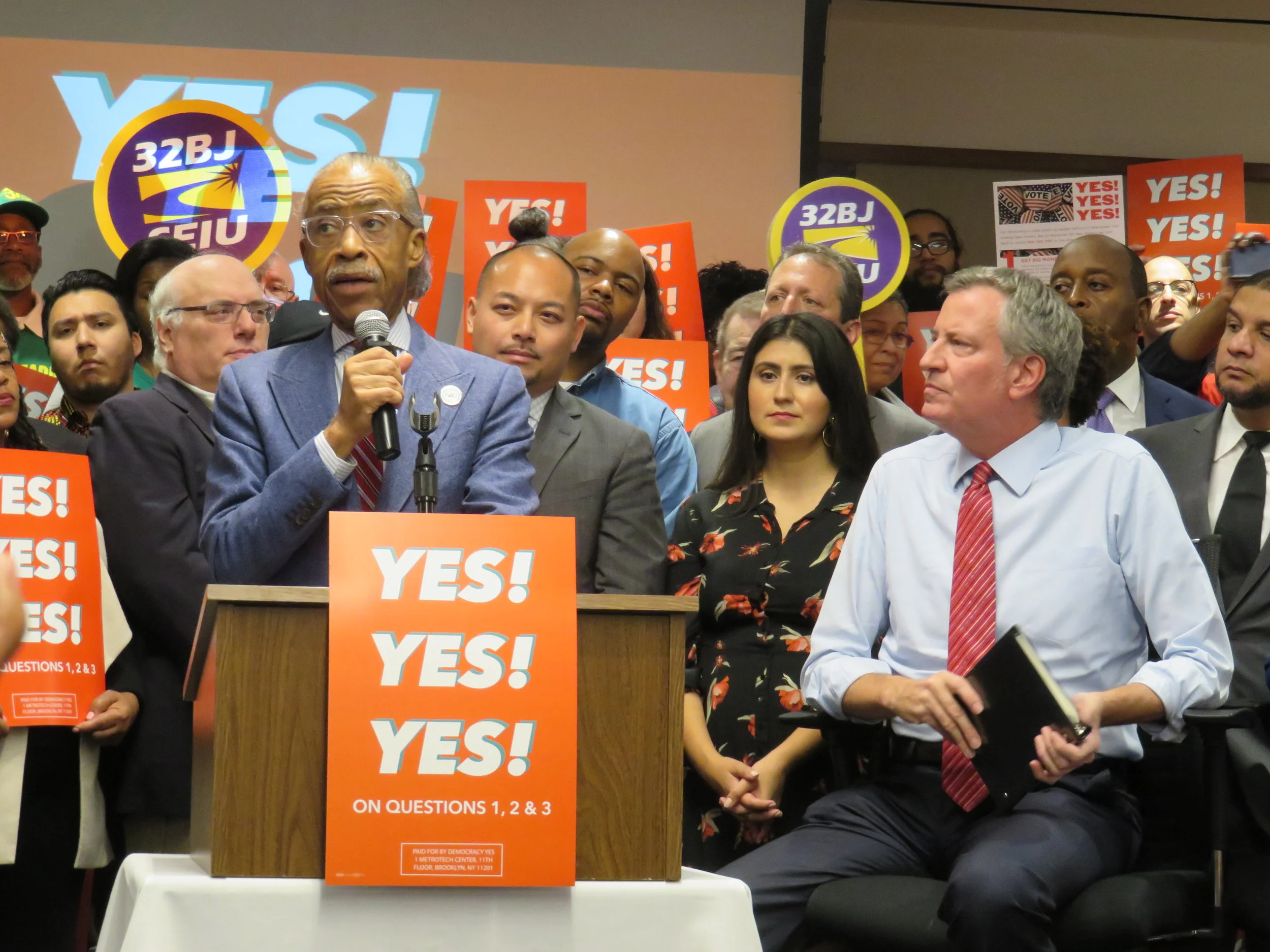De Blasio Stumps For Charter Revision Ballot Proposals
/By David Brand
Mayor Bill de Blasio visited the headquarters of the 32BJ union Thursday to call on New York City residents to vote in favor of three ballot proposals that he said will “open the doors” of democracy to young people, low-income New Yorkers and residents of diverse backgrounds.
De Blasio was joined by U.S. Rep. Carolyn Maloney, Queens State Senate candidate Jessica Ramos and civil rights leader Rev. Al Sharpton, who called on New Yorkers to vote “yes” to institute community board term limits, lower the amount of money a candidate for city government is allowed to accept from a single donor and create a “Civic Engagement Commission” under the jurisdiction of the mayor.
Though the rally was light on details about the specific ballot proposals, it was full of soaring rhetoric about the power of participatory democracy.
Mayor Bill de Blasio urges New Yorkers to flip their ballot in order to vote in favor of three charter revision ballot proposals as Queens State Senate candidate Jessica Ramos (right of de Blasio) looks on. // Eagle photo by David Brand
“This is one way of saying, ‘Let’s give everyone a chance to participate,’” de Blasio said while criticizing the outsized role of wealthy donors in electoral politics. “Imagine if all the money you needed [to run for office] was from everyday people.”
Ballot Proposal No. 1 would decrease the maximum individual contribution that candidates for citywide office, who participate in the city matching funds program, can receive from $5,100 to $2,000.
When asked by a reporter how he reconciles starting multiple Super PACs and soliciting contributions from extremely wealthy donors with his advocacy for a city campaign contribution limit, de Blasio said he works within the “existing set of laws.”
“We’re dealing with trying to change the rules of the game at every level,” he said. “When we go further on Tuesday, other cities are going to emulate it, other states are going to emulate it.”
De Blasio also said community board term limits — proposal No. 3 — would ensure a 50-member body that accurately reflects the demographics of the community district.
“We’ve got to represent the composition of the community today not the community 30 or 40 years ago,” he said. “I think It’s objectively fair to say that if you look at the numbers, a lot of communities . . . are just not represented by demographics, by age.”
Sharpton called the ballot proposals put forth by the mayor’s Charter Revision Commission “a voting rights issue.”
Rev. Al Sharpton called the ballot proposals a “voting rights” issue. // Eagle photos by David Brand
“We cannot forget that all of us did not get the right to vote just by being born,” Sharpton said. “To not vote yes is to invalidate why poor people fought for the right to vote in the first place.”
Sharpton likened the charter revision ballot proposals to the civil rights struggle, embodied by black marchers who were beaten by the police as they crossed the Edmund Pettus Bridge in Selma, AL and those who died demanding the right to vote.
“They did not die so that in Donald Trump’s town, only Donald Trump types” could control the political process, he said.
District 5 Councilmember Ben Kallos gestured to the crowd of union members of various backgrounds and said that community board term limits would “invite the gorgeous diversity we see here.”
But critics of the community board ballot proposal, including Queens Borough President Melinda Katz and three other borough presidents, said community board term limits would erode vital institutional knowledge from community boards, which can serve as a counterweight to the interests of wealthy developers.
Other critics say the campaign finance ballot proposal does not go far enough to address campaign bundling and independent expenditures— campaign communications that promote a candidate but are not specifically endorsed by the candidate.
De Blasio’s message at the rally echoed the theme of his Tuesday op-ed for the Eagle.
“We are going to participate more and do everything we can to ensure that everyone, no matter how much they earn, where they worship, when they came here, what language they speak, what color they see when they look in the mirror, that everyone gets to have their say,” de Blasio wrote.





